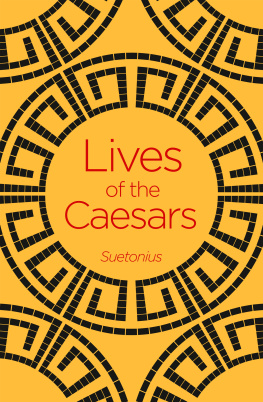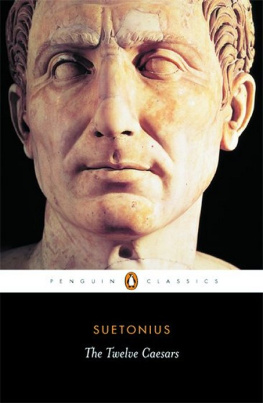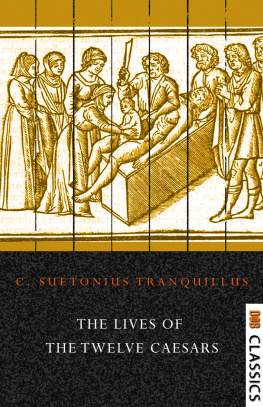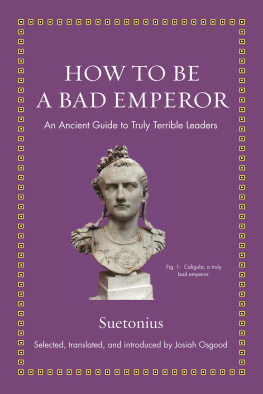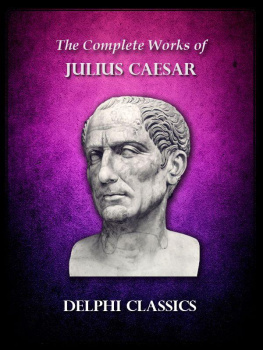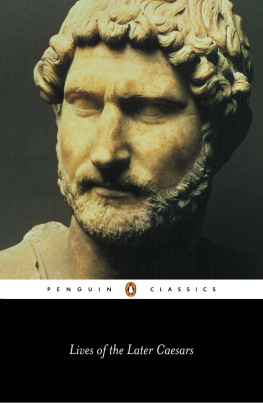Suetonius - Lives of the Caesars
Here you can read online Suetonius - Lives of the Caesars full text of the book (entire story) in english for free. Download pdf and epub, get meaning, cover and reviews about this ebook. year: 2020, publisher: Arcturus Digital Limited, genre: Detective and thriller. Description of the work, (preface) as well as reviews are available. Best literature library LitArk.com created for fans of good reading and offers a wide selection of genres:
Romance novel
Science fiction
Adventure
Detective
Science
History
Home and family
Prose
Art
Politics
Computer
Non-fiction
Religion
Business
Children
Humor
Choose a favorite category and find really read worthwhile books. Enjoy immersion in the world of imagination, feel the emotions of the characters or learn something new for yourself, make an fascinating discovery.
- Book:Lives of the Caesars
- Author:
- Publisher:Arcturus Digital Limited
- Genre:
- Year:2020
- Rating:3 / 5
- Favourites:Add to favourites
- Your mark:
- 60
- 1
- 2
- 3
- 4
- 5
Lives of the Caesars: summary, description and annotation
We offer to read an annotation, description, summary or preface (depends on what the author of the book "Lives of the Caesars" wrote himself). If you haven't found the necessary information about the book — write in the comments, we will try to find it.
Lives of the Caesars — read online for free the complete book (whole text) full work
Below is the text of the book, divided by pages. System saving the place of the last page read, allows you to conveniently read the book "Lives of the Caesars" online for free, without having to search again every time where you left off. Put a bookmark, and you can go to the page where you finished reading at any time.
Font size:
Interval:
Bookmark:
Gaius Suetonius Tranquillus was a Roman historian and writer, probably born in Hippo Regius in North Africa in ad 69, the so-called year of the four emperors. His father was a military tribune who fought in the civil wars of the period. As a young man, like many of his contemporaries, Suetonius travelled to Rome to study rhetoric and oration and he found a powerful patron in Pliny the Younger.
A close friendship grew up between Suetonius and Pliny, and it was Pliny who urged him to publish his earlier works. Only fragments remain of most of his writings, including De Viris Illustribus (Lives of Illustrious Men), a study of more than 100 Roman writers. He wrote on a range of subjects, including sports, customs, dress and politics.
After Plinys death, Suetonius held a series of posts in the imperial court. He administered the imperial libraries in Rome, managed the emperors personal archives and served as imperial secretary first for Trajan and then for his successor, Hadrian. Due to his status in the court, he had unique access to the archives of the Roman empire, which contained a wealth of biographical information about previous emperors.
Suetonius produced his greatest work in ad 121, De Vita Caesarum (The Lives of the Caesars). It provides a lively and amusing biographical account of 12 Roman emperors, beginning with Julius Caesar and ending with Domitian. His candid accounts of each emperors personal life and reign have proved to be one of the most valuable sources on the history of Rome in the first century after the fall of the republic. The book is famed for its outspoken and even scandalous revelations about the emperors. It was the only work of Suetonius to survive in complete form to the present day.
In the course of his sixteenth year he lost his father. In the next consulate, having previously been nominated priest of Jupiter, he broke his engagement with Cossutia, a lady of only equestrian rank, but very wealthy, who had been betrothed to him before he assumed the gown of manhood, and married Cornelia, daughter of that Cinna who was four times consul, by whom he afterwards had a daughter Julia; and the dictator Sulla could by no means force him to put away his wife. Therefore besides being punished by the loss of his priesthood, his wifes dowry, and his family inheritances, Caesar was held to be one of the opposite party. He was accordingly forced to go into hiding, and though suffering from a severe attack of quartan ague, to change from one covert to another almost every night, and save himself from Sullas detectives by bribes. But at last, through the good offices of the Vestal virgins and of his nearest kinsmen, Mamercus Aemilius and Aurelius Cotta, he obtained forgiveness. Everyone knows that when Sulla had long held out against the most devoted and eminent men of his party who interceded for Caesar, and they obstinately persisted, he at last gave way and cried, either by divine inspiration or a shrewd forecast: Have your way and take him; only bear in mind that the man you are so eager to save will one day deal the death blow to the cause of the aristocracy, which you have joined with me in upholding; for in this Caesar there is more than one Marius.
He served his first campaign in Asia on the personal staff of Marcus Thermus, governor of the province. Being sent by Thermus to Bithynia, to fetch a fleet, he dawdled so long at the court of Nicomedes that he was suspected of improper relations with the king; and he lent colour to this scandal by going back to Bithynia a few days after his return, with the alleged purpose of collecting a debt for a freedman, one of his dependents. During the rest of the campaign he enjoyed a better reputation, and at the storming of Mytilene Thermus awarded him the civic crown.
He served too under Servilius Isauricus in Cilicia, but only for a short time; for learning of the death of Sulla, and at the same time hoping to profit by a counter revolution which Marcus Lepidus was setting on foot, he hurriedly returned to Rome. But he did not make common cause with Lepidus, although he was offered highly favourable terms, through lack of confidence both in that leaders capacity and in the outlook, which he found less promising than he had expected.
Then, after the civil disturbance had been quieted, he brought a charge of extortion against Cornelius Dolabella, an ex-consul who had been honoured with a triumph. On the acquittal of Dolabella Caesar determined to withdraw to Rhodes, to escape from the ill-will which he had incurred, and at the same time to rest and have leisure to study under Apollonius Molo, the most eminent teacher of oratory of that time. While crossing to Rhodes, after the winter season had already begun, he was taken by pirates near the island of Pharmacussa and remained in their custody for nearly forty days in a state of intense vexation, attended only by a single physician and two body-servants; for he had sent off his travelling companions and the rest of his attendants at the outset, to raise money for his ransom. Once he was set on shore on payment of fifty talents, he did not delay then and there to launch a fleet and pursue the departing pirates, and the moment they were in his power to inflict on them the punishment which he had often threatened when joking with them. He then proceeded to Rhodes, but as Mithridates was devastating the neighbouring regions, he crossed over into Asia, to avoid the appearance of inaction when the allies of the Roman people were in danger. There he levied a band of auxiliaries and drove the kings prefect from the province, thus holding the wavering and irresolute states to their allegiance.
While serving as military tribune, the first office which was conferred on him by vote of the people after his return to Rome, he ardently supported the leaders in the attempt to re-establish the authority of the tribunes of the commons, the extent of which Sulla had curtailed. Furthermore, through a bill proposed by one Plotius, he effected the recall of his wifes brother Lucius Cinna, as well as of the other who had taken part with Lepidus in his revolution and after the consuls death had fled to Sertorius; and he personally spoke in favour of the measure.
When quaestor, he pronounced the customary orations from the rostra in praise of his aunt Julia and his wife Cornelia, who had both died. And in the eulogy of his aunt he spoke in the following terms of her paternal and maternal ancestry and that of his own father: The family of my aunt Julia is descended by her mother from the kings, and on her fathers side is akin to the immortal Gods; for the Marcii Reges (her mothers family name) go back to Ancus Marcius, and the Julii, the family of which ours is a branch, to Venus. Our stock therefore has at once the sanctity of kings, whose power is supreme among mortal men, and the claim to reverence which attaches to the Gods, who hold sway over kings themselves.
In place of Cornelia he took to wife Pompeia, daughter of Quintus Pompeius and granddaughter of Lucius Sulla. But he afterward divorced her, suspecting her of adultery with Publius Clodius; and in fact the report that Clodius had gained access to her in womans garb during a public religious ceremony was so persistent, that the senate decreed that the pollution of the sacred rites be judicially investigated.
As quaestor it fell to his lot to serve in Farther Spain. When he was there, while making the circuit of the assize-towns, to hold court under commission from the praetor, he came to Gades, and noticing a statue of Alexander the Great in the temple of Hercules, he heaved a sigh, and as if out of patience with his own incapacity in having as yet done nothing noteworthy at a time of life when Alexander had already brought the world to his feet, he straightway asked for his discharge, to grasp the first opportunity for greater enterprises at Rome. Furthermore, when he was dismayed by a dream the following night (for he thought that he had offered violence to his mother) the soothsayers inspired him with high hopes by their interpretation, which was: that he was destined to rule the world, since the mother whom he had seen in his power was none other than the earth, which is regarded as the common parent of all mankind.
Font size:
Interval:
Bookmark:
Similar books «Lives of the Caesars»
Look at similar books to Lives of the Caesars. We have selected literature similar in name and meaning in the hope of providing readers with more options to find new, interesting, not yet read works.
Discussion, reviews of the book Lives of the Caesars and just readers' own opinions. Leave your comments, write what you think about the work, its meaning or the main characters. Specify what exactly you liked and what you didn't like, and why you think so.

